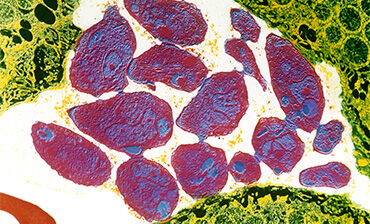Toxoplasmosis

Toxoplasmosis is an infection caused by a parasite, found in cats, which expels cysts that infect other animals and humans. These cysts survive in the environment for a long time and can contaminate food.
Humans become infected by ingesting the cysts or by eating undercooked food containing the cysts, especially pork and lamb.
The disease usually has no symptoms, although people may notice swollen glands. Toxoplasmosis can cause illness, with potential mortality, in people with impaired immune systems.
Pregnant women, even if they do not experience symptoms, can transmit the infection to the foetus, leading to miscarriage or severe malformations affecting the eyes and brain of infants.




